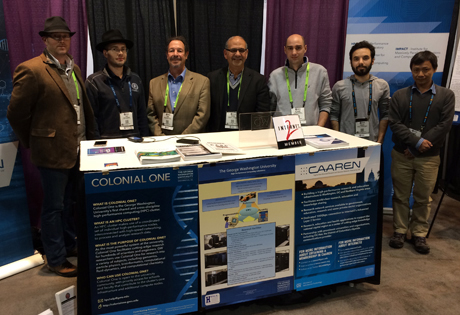Faculty and staff from The George Washington University recently participated in the International Conference for High Performance Computing, Networking, Storage and Analysis (SC14). GW was well represented at SC14 by staff from the Division of Information Technology (IT) and researchers from the School of Engineering and Applied Science (SEAS). The conference, attended by more than 10,000 people, gives universities, institutions, companies and others an opportunity to showcase and share their innovative technologies to help open the door to new scientific and economic opportunities.
Professor El-Ghazawi and his research team, on behalf of the Institute for Massively Parallel Applications and Computing Technologies (IMPACT), in cooperation with the Division of IT, hosted an exhibit booth showcasing many of GW’s high performance computing activities.
The Division of IT staff showcased their latest technologies, including Colonial One, the Capital Area Advanced Research and Education Network (CAAREN) and other research projects.
The university’s first shared, cross-discipline high performance computing (HPC) cluster, Colonial One makes use of a coordinated set of high-performance nodes, interconnected with high-speed networking to process and analyze research data. As the most powerful system at the university, Colonial One facilitates cutting-edge research for hundreds of scientists and engineers.
GW also showcased CAAREN, an initiative designed to build a high-performance research and education infrastructure serving the Washington, D.C. and Northern Virginia areas. CAAREN facilitates world-class research, education and knowledge sharing in the nation’s capital with access to Internet2’s advanced Layer 2 Service and applications to support research, health and education initiatives.
Professor El-Ghazawi, the principal investigator for the High Performance Computing Laboratory (HPCL), also participated in research exhibits for the PGAS Programming Models and the NSF CHREC center, two national initiatives in which GW plays a major role. Additionally, El-Ghazawi chaired a Bird-of-a-Feather conference session “PGAS - The Partitioned Global Address Space Programming Model,” which drew more than 100 attendees.
HPCL, located at GW’s Virginia Science & Technology Campus, focuses its research on improving the parallel and distributed computing environment, with an emphasis on high-speed computing. The lab operates through CHREC (the Center for High-Performance Reconfigurable Computing), with joint funding from the National Science Foundation, industry, government and IMPACT.


